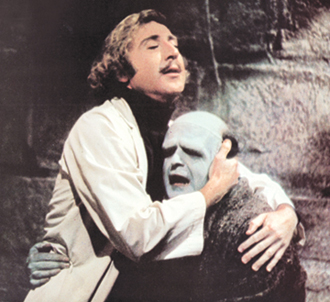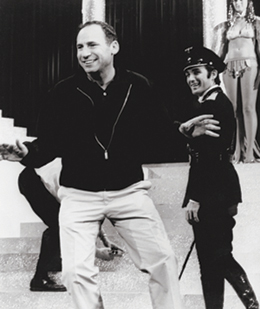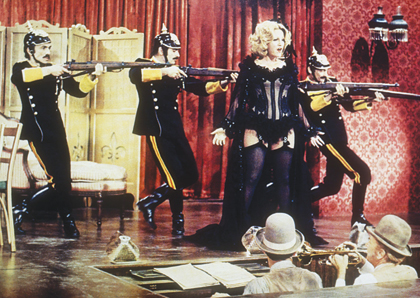By Gary Giddins
Writing about movie comedy six or seven decades old is a safe endeavor: Consensus has accrued about Chaplin and Keaton, Lubitsch and Sturges, Fields and the Marx Brothers. Criticizing more recent comedy is rather like evaluating pornography: One person's yuk is another's yuck, particularly in the DVD era, where the absence of an audience's contagious laughter creates a daunting silence—every joke must plead for the mercy of a chuckle, titter, or smile. After four decades, we still hear debates over Jerry Lewis and Blake Edwards, and arguments over early-Woody versus later-Woody versus Euro-Woody, not to mention new franchises like The Hangover or the Fockers. Still, no comic filmmaker generated more outrage than Mel Brooks, the most rowdily funny and quotable director-writer-actor to emerge in the 1960s—the master of the subversive guffaw.
 Young Frankenstein (1974)
Young Frankenstein (1974) Most of the 11 films Brooks directed were greeted with a measure of derision and incomprehension. One reviewer argued that two Jewish producers would never back a show saluting Hitler, and several admirers of his earlier films found their sensibilities abused when Brooks poached on the sacred ground of Alfred Hitchcock in High Anxiety (Pauline Kael complained that it lacked suspense). His films are frequently viewed as sketch-comedy, his thematic concerns ignored, and his directorial authority unsung. Brooks has not directed a film in more than 15 years, and reassessment is due if only to consider his work untethered to the decades it helped to define.
Brooks was raised in Brooklyn by his impoverished Russian-born mother, after the death of his father when Mel was 2. Those circumstances fulfilled the dictum that eminent comedians must endure a Dickensian childhood, and provided him with a recurring theme of young men seeking father-substitutes. After trying stand-up and Catskills tummeling, he joined the writing team on Sid Caesar's Your Show of Shows, and then achieved fame as the 2000 Year Old Man, the title of his and Carl Reiner's million-selling record. On Man, they conducted faux-interviews in which Brooks burlesqued the wandering Jew who attended the Crucifixion and dated Joan of Arc ("what a cutie")—sort of a long-lived predecessor to Woody Allen's Zelig but with brazen ethnic attitude. Indeed, his characterization was aggressively Jewish to a degree unparalleled in American humor to that time, and its nerviness fueled his work as a filmmaker, exceeding the conventional boundaries of spoofs he worked on for Caesar and his own TV series, Get Smart.
Brooks was 42 when he made The Producers in 1968, a watershed period in Hollywood, as studios headed for the auction block and the Production Code faded into nothingness. It played art houses in major cities, neither a commercial nor critical success—The New York Times grumpily labeled it "a violently mixed bag." Yet no movie did more to reshape the boundaries of American film comedy. An insider's look at Broadway that combined Marx Brothers anarchy with Laurel and Hardy mellowness, it delighted those in on the joke and infuriated those who weren't.
 The Producers (1968)
The Producers (1968) Everything about it was novel, not just the content, in which Zero Mostel (a stage titan unknown to most filmgoers) diddles very old ladies for money, a druggy paean to Hitler triumphs on Broadway, and homosexuality is camped up with paradoxical affection. The direction, patronized as amateurish at the time, is distinct in cutting and tempo, and the film endures as a classic partly because of Brooks' visual conceits. The first 20-plus minutes, shot almost entirely in one small office, cramped by the immensity of Mostel's bulk and Gene Wilder's hysteria, are a claustrophobic tour de force, fractured with nuanced silences and extreme close-ups, filmed mostly in extended two-shots—Brooks never fell into the trap of over-the-shoulder dialogues. An example of perfect
directorial timing is the editing of the "Springtime for Hitler" musical number, when the camera cuts to a Busby Berkeley-like overhead shot of a revolving swastika.
Brooks' best films are animated by two contrary impulses: to tear away the margins of bourgeois "good taste" and settle his hero in a satisfying coupling—paternal, fraternal, or romantic. In The Producers, Mostel's aging rake Max and Wilder's fainthearted accountant Leo have nothing in common beyond weird haircuts. Max's symbolic seduction of the younger man going through Central Park is a montage of courtship clichés dating back to the silent era, and Brooks shot it without dialogue, transforming those clichés into a Manhattan valentine complete with one of the movies' grandest ejaculations: a wideshot of fountains roaring to life to cement their professional pact—again, perfect timing. The Producers, like most Brooks pictures, was shot on a tight budget, but except for a sign advertising their show on what looks like a high school poster rather than a marquee, it confidently reflects its time and place.
If the most essential skill for a comedy director is the ability to inspire funny people to be funny, the knack for eliciting laughs from dramatic actors separates heavyweights from dabblers. Few can match Brooks' record for bringing diverse performers to the top of their comedic game. This became clear in his annus mirabilis, 1974, when he stormed multiplexes with consecutive blockbusters, Blazing Saddles and Young Frankenstein. One expected comic turns from Wilder, Dom DeLuise, Harvey Korman, Slim Pickens, Teri Garr, Kenneth Mars, Marty Feldman, and the incomparable Madeline Kahn. One did not anticipate the mirthful sedition lurking in the hearts of Gene Hackman, Peter Boyle, Cleavon Little, David Huddleston, Jack Starrett, and Cloris Leachman, whose career soon made a quick turn into sitcoms. Even Wilder had been known chiefly as a dramatic actor before he met Brooks.
Blazing Saddles tossed every dart its five writers could muster at the Western and propriety, adding interracial sex, ethnic slurs, and the effect beans have on digestion. Beginning with a disarming visual pun (a tracking shot of tracks), it is surely the first film in which the only sane character is a black man who plays it cool in a society riven by greed, casual hatred, and "morons." Brooks' genius for staging musical parodies yielded Kahn's faultless takeoff on Marlene Dietrich: "A wed wose. How womantic." Seen 37 years later, Blazing Saddles is less likely to outrage; some jokes may go over the heads of those who've never heard of Gabby Hayes, Richard Dix, and a host of Johnsons. But it now plays as a more satisfying total film, sturdily directed and shrewdly paced. The stunt work is superb, the Western ambience credible, the actors encouraged to milk their parts—not least in the long colloquy between Little's sheriff and Wilder's alcoholic gunman, substituting fraternal acceptance for father-son longing. One of Brooks' favorite jokes—the musical score invades the action of the film—is deployed in a delicious, surprise pan as the heroes, dressed as Saturday matinee cowboys, ride over the plains, right past the Count Basie Orchestra, its leader tipping his signature yachting cap.
Young Frankenstein, written by Brooks and Wilder, is widely regarded as Brooks' masterpiece, clinching his assault on Hollywood conventions and setting off a flood of parodies, from Airplane! to Austin Powers. It is the one Frankenstein entry where no one is killed and good sex is rampant. A frequent criticism of Brooks was that he didn't know how to build comedy, and simply stitched bits and sketches—a complaint hard to fathom. Brooks, aided by black-and-white photography and old Universal sets, completely owned the material, developing the laugh-ratio from passing gags to elaborate set pieces to a finely gauged finish. He opens with disproportionately long tracking of a coffin (much the way he later introduced the ship in Spaceballs) and indulges requisite scientific blather before picking up comic steam with one-liners, musical puns, and shamelessly hoary routines. Among the hoariest is the revolving library wall, which Brooks shoots with minimal inserts, declining to show the reverse side of the wall so that the biggest laugh is generated by a disembodied voice. The tempo then revs up with more intricate episodes followed by three matchless set pieces: the four-minute tête-à-tête between Boyle's monster and Hackman's blind man; the father-son rapprochement ("Hello, handsome," says Wilder's Frankenstein greeting his creation); and another stunningly funny musical spoof, as Frankenstein introduces the monster to the scientific community with a duet of "Puttin' on the Ritz." Each of these scenes is structured as a surprise (Hackman? Irving Berlin?) and finds Brooks equally at home in cabin, dungeon, and theater. In the end, he reprises the trial from The Producers, as the monster pleads for the man who gave him life, but with a sexy punch line: a brain transfusion gives father and son equal erotic potency.
 Blazing Saddles (1974)
Blazing Saddles (1974) Silent Movie (1976) represented a complete visual turnaround, returning to color and employing the controlling metaphor of Mel Funn (Brooks) and comrades merrily cruising Hollywood's boulevards in sunlight even Tahitians would envy—despite a subtext of fear and loathing conveyed through silent images that rarely draw on the clichés of silent movies. For sheer laugh-power, however, Brooks' strongest film is High Anxiety (1977), which stirs a pot drawn from several classic Hitchcock episodes, James Bond, Jack Benny, Blow-Up, and lounge crooning.
Brooks' triumph in High Anxiety is that while lampooning hallmark scenes from Psycho, The Birds, North by Northwest, and Vertigo, he defines his own directorial style. He has to convey the basic idea of those scenes without imitating them, which means they must be set up and played out with bracing efficiency so as not to distract from the overall tempo. His real target isn't Hitchcock, but rather the general style of pervasive ominousness. He opens with a long virtuoso credit sequence in which every shot, edit, and musical phrase foreshadows calamity. The payoff is a line of dialogue: Brooks the director is almost always in service to Brooks the writer. But he later makes the same point with a single, silent shot: a zoom that zooms right through a plate glass window, no spoken payoff necessary. Just about everything in High Anxiety works, and it's all pure Brooks.
In the 1980s, Brooks produced dramatic films and a remake of Ernst Lubitsch's To Be or Not to Be, in which he did penance for his many gay jokes by emphasizing Hitler's persecution of gays, and co-starred with his wife, the incandescent, very funny Anne Bancroft. But his own films grew scattershot. History of the World: Part I (1981) has the most elaborate of his musical parodies, the Spanish Inquisition as imagined by Busby Berkeley and Jerome Robbins, which proved that he could still drop jaws. Spaceballs (1987) is congenial, but Star Wars proved a glib foil, despite the father-son theme, and Robin Hood: Men in Tights (1993) has too many lines like "white men can't jump," which were beneath Brooks (and the then-unknown Dave Chappelle), as were the vain self-defeating quotations from his earlier work. Yet in his last film to date, Dracula: Dead and Loving It (1995), Brooks returns to form. If it lacks Young Frankenstein's atmospherics, riotous invention, and higher budget (just compare the cobwebs), it holds its own with sure pacing, excellent performances, witty special effects, and a climactic blood-drenched guffaw. Audiences in 1995, expecting relentless hilarity, left dissatisfied. Today, we can admire how narratively entertaining and focused it is. The jokes have a gentle reliability and the windup is fully consistent with the Brooksian point of view: The dad Dracula is dead and son Renfield is doomed to a diet of bugs in an asylum run by a doctor whose sole prescription is: "Give him an enema—it'll give him a sense of accomplishment."